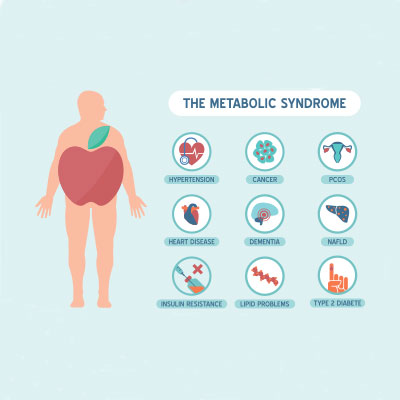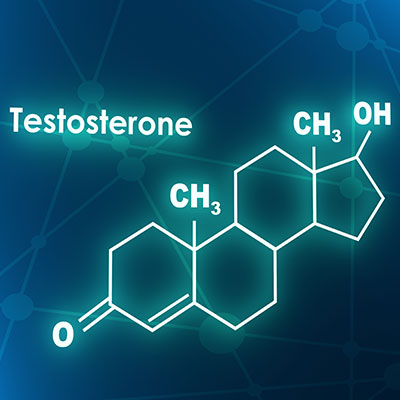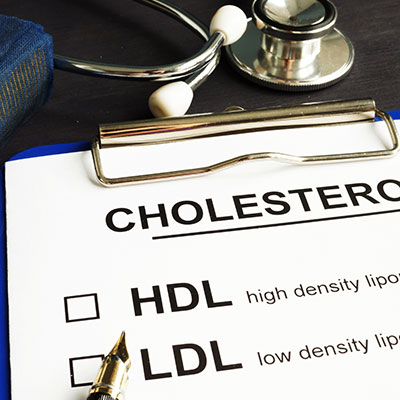How Being Overweight Affects Testosterone Levels
Contents
- Obesity and Testosterone
- How Does Being Overweight Affect Testosterone Levels?
- Does Weight Gain Decrease Your Testosterone?
- What Is the Link Between Testosterone Deficiency and Weight Gain?
- What Is the Relationship Between Testosterone and Metabolic Syndrome?
- Does Testosterone Therapy Reduce the Risks of Obesity and Developing Metabolic Syndrome?
- What Does the Medical Research Say About Obesity and Testosterone?

Obesity and low testosterone are tightly linked. In recent years, medical science has recognized the links between low testosterone and other medical conditions. Most notably, men with low testosterone tend to suffer from various “metabolic conditions,” such as diabetes, high blood pressure, and heart disease. Men with low testosterone also tend to be overweight. A recent study found that men over 45 who were obese were three times as likely to have low testosterone than men of the same age who were of average weight.
Obesity and Testosterone
The link between obesity and testosterone is undeniable. Obese men are more likely to have low testosterone. Men with low testosterone are also more likely to become obese.
Current research suggests that of all the possible risk factors of low testosterone in men, obesity is the most effective predictor of testosterone deficiency syndrome.
How Does Being Overweight Affect Testosterone Levels?
There’s actually a number of reasons why obesity contributes to low testosterone levels, but the most significant one has to do with fat cells. Scientists have discovered that fat cells have a high amount of a particular enzyme named aromatase. Aromatase within fat cells metabolizes testosterone into estrogen, which lowers your overall testosterone level. Abdominal fat, in particular, is known to possess high levels of aromatase enzymes. This is why men with excessive belly fat, or who are “pear-shaped,” are particularly likely to be suffering from low testosterone.
Also, obesity reduces sex hormone-binding globulin (SHBG) levels, a protein that carries testosterone in the blood. Less SHBG means less free testosterone.
Does Weight Gain Decrease Your Testosterone?
Putting on excessive pounds definitely can lower your testosterone level.
The converse is also true. Several research studies have found that losing weight through diet and exercise can increase testosterone levels. Specific exercises, such as strength training and weightlifting, have been proven to significantly raise testosterone levels.
A remarkably interesting study on the link between obesity and testosterone found that morbidly obese men who have lost substantial weight thanks to bariatric surgery saw significant increases in testosterone levels after the procedure. The study found that low testosterone in obese males was rapidly reversed – in as little as 3 to 4 weeks – following bariatric surgery.
What Is the Link Between Testosterone Deficiency and Weight Gain?
Just as being overweight can cause your testosterone levels to drop, having low testosterone can also lead to weight gain. The relationship between low testosterone and weight gain in men can become a vicious cycle. Low testosterone causes a lack of energy, slower metabolism, and insulin resistance, all of which lead to weight gain. Those extra pounds, in turn, further lower your testosterone. It becomes a negative feedback loop; the more weight you gain, the lower your testosterone levels drop.
You can break the cycle by exercising and making other lifestyle changes that are designed to lose weight. As you boost your testosterone level, you increase lean muscle. Increased lean muscle raises your metabolism and helps you to burn more fat. Burning more fat increases your energy, and now you can exercise more and even further increase your testosterone levels.
Men with low testosterone who are overweight and cannot raise their testosterone levels by lifestyle changes alone could be good candidates for testosterone replacement therapy.
Testosterone therapy has been proven to help men with low testosterone to gain muscle and lose weight, particularly belly fat.
What Is the Relationship Between Testosterone and Metabolic Syndrome?

Metabolic syndrome is described as a series of medical problems that together increase your risk of heart disease, stroke, and type 2 diabetes. These conditions include increased blood pressure, high blood sugar, excess body fat around the waist, and abnormal cholesterol or triglyceride levels.
Most of the risk factors for developing metabolic syndrome are related to obesity. As we have already discussed, men with low testosterone tend to be overweight. In particular, they have an excess of belly fat. Also, men with low testosterone tend to also have one or more of the conditions associated with metabolic syndrome.
Men with diabetes and/or some of the other conditions associated with metabolic syndrome almost always also have low testosterone. This is especially true of men over 45, the very same age group that is most at risk of death from stroke or heart attack.
Does Testosterone Therapy Reduce the Risks of Obesity and Developing Metabolic Syndrome?
The best treatment for men with low testosterone is testosterone replacement therapy.
Testosterone therapy is not prescribed specifically as a treatment for metabolic syndrome or for obesity. However, since testosterone therapy can reduce or eliminate several of the risk factors that lead to obesity and metabolic syndrome, it does lessen your risk of developing both of these life-threatening conditions.
Besides reducing your risk of developing obesity and perhaps helping you to lose weight and keep it off, there are many other positive benefits of testosterone replacement. While research continues into how and why they are linked, we know that testosterone therapy can reduce your risk of developing diabetes, obesity, and the other conditions associated with metabolic syndrome.
In addition to lowering your risk of becoming obese and developing metabolic syndrome, testosterone therapy can:
- Improve your sex drive and sexual performance
- Increase stamina and increase your energy level
- Improve your memory and other cognitive abilities
- Improve your ability to build muscle
- Improve sleep
- Lessen your risk of developing anxiety and depression
What Does the Medical Research Say About Obesity and Testosterone?
Research studies have shown many times that obesity lowers testosterone levels.
For example, according to a Harvard Health paper on testosterone and obesity, entitled Obesity: Trusted sourceObesity: Unhealthy and unmanlyHarvard Health PublishingGo to sourceUnhealthy and Unmanly, a 2007 study of men aged 40 and above found that each one-point increase in body mass index (BMI) was associated with a 2% decrease in testosterone. Obesity is defined as BMI is 30 or higher.
The Harvard report also pointed to a 2008 study of men aged 30 and over that found that waist circumference was an even stronger predictor of low testosterone levels than BMI. A four-inch increase in waist size increased a man’s odds of having a low testosterone level by 75%; for comparison, ten years of aging increased the odds by only 36%. All in all, waist circumference was the strongest single predictor of developing symptoms of testosterone deficiency.
A 2014 study published in the Trusted sourceLowered testosterone in male obesity: mechanisms, morbidity and managementNCBIGo to sourceAsian Journal Andrology found that even “moderate obesity” could lead to drops in testosterone, with the researchers concluding, “moderate obesity predominantly decreases total testosterone due to insulin resistance-associated reductions in SHBG.”
A quite recent study published in the October 2020 edition of Trusted sourceTestosterone Therapy for Prevention and Treatment of Obesity in Men Mary Ann Liebert, Inc., PublishersGo to sourceAndrogens: Clinical Research and Therapeutics concluded that – “Thanks to the metabolic effects of testosterone, testosterone therapy results in more fat loss and preservation of fat-free mass, compared with diet/exercise interventions alone. In contrast to weight loss achieved by diet/exercise and bariatric surgery, testosterone therapy significantly preserves both muscle and bone mass. Further, testosterone therapy has psychological effects that may increase the motivation and ability of men to adhere to diet/exercise programs. Real-world evidence studies of long-term testosterone therapy for up to 11 years provide compelling evidence that testosterone therapy holds tremendous potential as a new treatment modality for obesity in men, with long-term weight loss maintenance and health benefits far exceeding those achieved by lifestyle interventions, approved obesity drugs, as well as bariatric surgery.”
It has long been suspected that there was a relationship between low testosterone levels and obesity. The studies presented here and many others confirm that link. These studies also have shown this link between low T and obesity is also present in men under 40. This is quite notable.
We have long thought that the decrease in testosterone seen in older men was primarily due to age. These studies have shown that even young men in their 30s and 40s, that are obese also have low testosterone. This indicates that a good part of the drop in testosterone typical of older men is actually due to the extra weight many men put on as they get older. This means that there is a good chance that testosterone levels can rebound through weight loss.
Now that you know a bit more about testosterone and obesity, why not contact us today, and find out more about the many life-changing benefits of testosterone replacement therapy.
FAQ
What is obesity?
Obesity is diagnosed when your body mass index (BMI) is 30 or higher. To determine your body mass index, divide your weight in pounds by your height in inches squared and multiply by 703. Or divide your weight in kilograms by your height in meters squared.
Is there a difference between being "overweight" and obesity?
People who are overweight or obese have an increased risk of developing health problems, such as diabetes, heart disease. Men who are overweight are at greater risk of developing hypogonadism or low testosterone. If you have a body mass index (BMI) of 25 to 30, you’re considered overweight. If you have a BMI greater than 30, you’re considered obese.
Who is at risk for obesity?
Obesity usually results from a combination of causes and contributing factors. Genetics, diet, activity level, age, gender, socioeconomic status, and certain disease conditions such as heart disease, diabetes, and low testosterone all contribute to your risk of developing obesity.
What causes obesity?
At its most basic level, obesity is caused by eating too much and exercising too little. If you consume high amounts of “energy-rich" (high caloric) foods, particularly foods laden with fats and sugars, but do not burn off those calories through exercise and physical activity, much of the surplus energy will be stored by the body as fat.
Other than genetic or other medical conditions, such as low testosterone that can lead to weight gain, lack of physical activity is the leading cause of obesity. Other than that, obesity usually develops gradually, as a result of poor diet and lifestyle choices, such as:
- Eating large amounts of processed or fast food – These foods tend to be high in fat and sugar
- Drinking too much alcohol - Alcohol contains a lot of calories, and people who drink heavily are often overweight
- Eating out a lot – When you eat out, instead of at home, you may be tempted to also have a starter or dessert, and the food can be higher in fat and sugar
- Eating larger portions than you need – Most people consume way more on their plates than they need in one setting
- Drinking too many sugary drinks – Soft drinks and fruit juices, in particular, can be very caloric
- Comfort eating – Turning to comfort food if you have low self-esteem or feel depressed is a sure way to gain weight.
What are the types of obesity?
Obesity is categorized by severity:
- Class 1: BMI of 30 to <35
- Class 2: BMI of 35 to <40
- Class 3: BMI of 40 or higher
Class 3, or “morbid obesity," is a condition in which individuals are at least 100 pounds over their ideal weight or have a body mass index of 40 or higher. Morbid obesity can result from emotional, biochemical, and genetic influences. It’s a potentially dangerous condition because it’s a risk factor for other medical problems that may lead to disability and early death.
What are the health risks associated with obesity?
People with obesity are more likely to develop a number of potentially serious health problems, including:
- Heart disease and strokes
- Type 2 diabetes
- Certain cancers
- Digestive problems
- Gynecological and sexual problems
- Sleep apnea
- Osteoarthritis
- More severe COVID-19 symptoms
- Low testosterone
- Mark Ng Tang Fui, MSD., Philippe Dupuis, Mathis Grossmann
- Amanda S. Mangolim, MD., Leonardo A. R. Brito, BS., and Vania S. Nunes-Nogueira, MD., PhD.
- Harvard Health Publishing
- M Diaz-Arjonilla, MD., M Schwarcz, R S Swerdloff, MD., C Wang, MD.
- Carla Pelusi, Renato Pasquali
- Endocrine Society
Lowered testosterone in male obesity: mechanisms, morbidity and management
Effectiveness of testosterone therapy in obese men with low testosterone levels, for losing weight, controlling obesity complications, and preventing cardiovascular events
Obesity: Unhealthy and unmanly
Obesity, low testosterone levels and erectile dysfunction
The Significance of Low Testosterone Levels in Obese Men
Overweight men can boost low testosterone levels by losing weight






